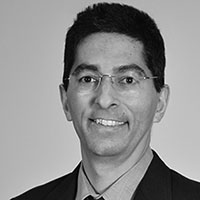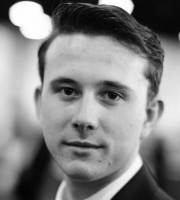
Rutgers students defend Holocaust-denier laws, religious power
Freedom of expression worldwide is under attack from identity politics, the Danish newspaper editor who first published cartoons of Mohammed 10 years ago told a Rutgers University event Thursday night.
Flemming Rose is promoting his new book, The Tyranny of Silence, which illustrates the greater debate surrounding free speech in light of religious extremism, political power and an increasingly globalized world. It was published less than two months before the massacre of journalists at French satirical weekly Charlie Hebdo.
The anti-religion bent of the panel discussion, which featured other free-speech activists, rubbed some students the wrong way. Though there were no visible protests, security was tight at the event.
According to Rose, the foreign editor of Jyllands-Posten, the trend in favor of suppressing speech is enabled by a misunderstanding of individual rights.
“People actually believe they have a right to not be offended, and this creates a grievance of fundamentalism that is being exploited by Islamists,” Rose said. The fact that they don’t have that right “is the price you pay for living in a liberal democracy.”
Blame ‘technology and migration’ for heightened sensitivity
The conflict between freedom of speech and politically correct sensitivity will increase because of globalization, according to Rose.
“Technology and migration in the globalized world has made people more sensitive. It makes it increasingly difficult to define who you are, and there are so many competing identities that are being proposed to us,” Rose said.
Rose blamed identity politics for fostering a divisive environment, saying “it is not what we should do as human beings. A lot of people do believe that it is not individuals who enjoy rights but religious or ethnic groups — it is a result of identity politics.”
Robert Shibley, executive director of the Foundation for Individual Rights in Education, connected global sensitivity to the imposition of “free speech zones” on college campuses.
“Students come to school without knowing their rights,” Shibley said. “Private universities can police free speech, but public universities cannot. Although, they have been suppressing free speech at the same rate for 7 years.”
 Panelists agreed that the free speech debate should begin with the notion that religious groups should not have real political power.
Panelists agreed that the free speech debate should begin with the notion that religious groups should not have real political power.
“In the aftermath of the Charlie Hebdo attacks no one is talking about the separation of church and state. No religion should have political power, no access to the state,” said Onkar Ghate, chief content officer for the Ayn Rand Institute, which promotes “reason, rational self-interest and laissez-faire capitalism.”
Going even further, Ghate said: “Using violence to gain political power has always been the case for monotheistic religions.”
Whither Holocaust-denier laws?
Students were eager to challenge the panelists on their views.
As the moderator, Rutgers philosophy professor Gregory Salmieri, opened the floor for questions, one self-identified Catholic student rushed to the microphone to question the speakers’ general skepticism of religious power.
Another member of the audience pushed the speakers on the boundaries of free speech in questioning their position on laws that criminalize Holocaust denial in Germany and France.
Protecting minority groups from speech they deem offensive, whether on campus or through criminal law, can’t justify taking away others’ speech, Rose said.
“I am in favor of getting rid of all hate speech laws and Holocaust denier laws in Europe,” he said. “If you protect the taboo of Jews then you have to do it for everyone, which ends in the tyranny of silence because you cannot say anything.”
Ghate agreed that Holocaust denial, while offensive, shouldn’t be banned: “Persecution of any ideology by the state helps [the ideology’s adherents] recruit.” He and Rose said such laws also prevent people from addressing deniers in a fair and legal debate.
Nora, a Rutgers student who declined to give her last name, told The College Fix she appreciated the discussion.
“They made some good points, but had a negative view of religion and religious institutions. Flemming had bad experiences to justify his opinion,” she said.
College Fix reporter Matthew Boyer is a student at Rutgers University.
Like The College Fix on Facebook / Follow us on Twitter
IMAGES: Gerry Lauzon/Flickr, Matthew Boyer, Ayn Rand Institute







Please join the conversation about our stories on Facebook, Twitter, Instagram, Reddit, MeWe, Rumble, Gab, Minds and Gettr.